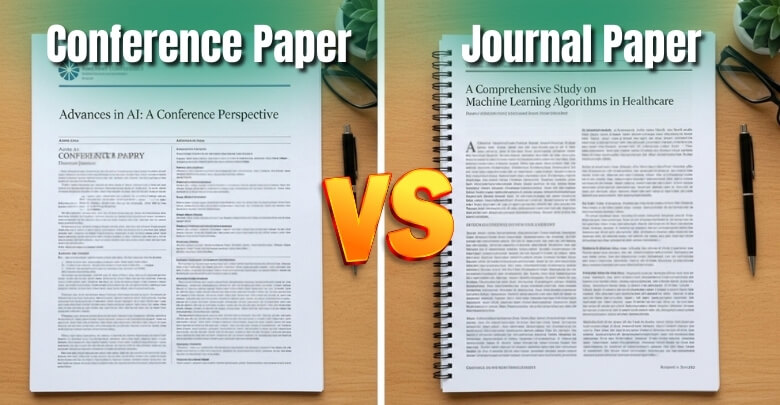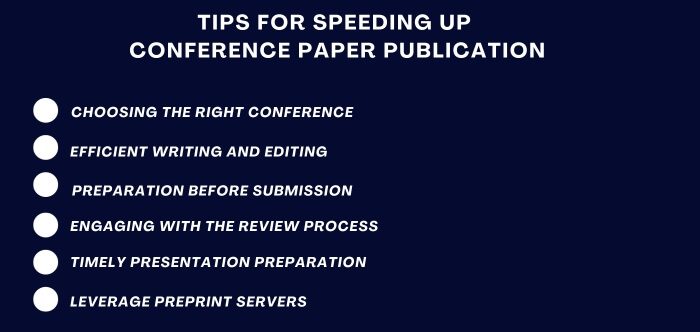Publishing research doesn’t stop once the writing is done. For many scholars, the real concern is how quickly their work will be shared with the academic community. Timelines can vary widely, and knowing what affects them makes a big difference.
So, how long does it take to publish a conference paper? On average, the process takes three to nine months from the initial submission to final publication. This timeframe depends on peer review cycles, author revisions, and how quickly publishers process the final files.
While no two conferences follow the exact same pace, having a clear idea of the typical stages helps you plan ahead. Keep reading to discover what influences the timeline and how you can make the process smoother and faster.
How Long Does It Take to Publish a Conference Paper?
Publishing a conference paper is not instant. From writing to final indexing, every stage adds time. On average, it takes 3 to 9 months to move from submission to official publication, depending on the review speed, revisions, and publisher processes.

Submission & Review
Once you submit your paper, it goes through peer review, where experts in the field check its quality and accuracy. This process usually takes 4 to 12 weeks, but it can stretch longer if there are many submissions or if reviewers need extra time.
Revisions & Camera-ready Preparation
After acceptance, you’ll be asked to make corrections and prepare a final version. This stage typically takes 2 to 6 weeks, depending on how much revision is required and how quickly you respond to reviewer comments. Formatting compliance also plays a big role here.
Publisher Processing
Once the final files are submitted, the publisher takes over. IEEE usually posts papers in Xplore 30 to 60 days after receiving them, while ACM often makes them available by the start of the conference if files are sent in advance. Events like the International Arts, Education, and Humanities conference usually follow this standard timeline, averaging 2 to 8 weeks.
Indexing in Databases
After publication, having your paper published in conference proceedings also means it must appear in major databases like Scopus, Web of Science, or Google Scholar. This indexing stage usually takes 1 to 8 weeks. The exact timing depends on the publisher’s agreements with indexing services and how quickly metadata is processed.
Quick Reference Template
| Stage | Typical Timeframe | Notes |
| Peer Review | 4–12 weeks | Experts check quality; delays happen if the reviewer pool is limited |
| Revisions & Camera-Ready | 2–6 weeks | Depends on revisions, formatting, and author responsiveness |
| Publisher Processing | 2–8 weeks | IEEE 30–60 days; ACM by day-one if early submission |
| Indexing (Scopus/Scholar) | 1–8 weeks | Relies on publisher–database agreements and metadata quality |
Most conference papers take a few months, not years, to be published. If you’ve ever asked how much time does it take to publish a paper, the answer usually falls between three and nine months. The exact timing depends on review cycles, revisions, and publisher schedules. Staying organized and responding quickly can help reduce delays and get your work published faster.
The Publication Timeline: Step by Step
Publishing a conference paper usually unfolds in clear stages, often referred to as the conference proceedings publication process. Here’s a quick overview with typical timeframes.
- Submission & Review (4–12 weeks): Once you begin the conference paper submission process, your paper goes through peer review, where experts in the field check its quality and accuracy.
- Acceptance & Camera-ready Prep (2–6 weeks): If accepted, you’ll revise based on reviewer comments and format the final version according to publisher guidelines.
- Conference Presentation (scheduled event): The paper is presented during the conference sessions, either orally or in poster form, depending on acceptance type.
- Proceedings Production & Upload (2–8 weeks): Publishers like IEEE and ACM handle editing, uploading, and assigning DOIs. IEEE typically takes 30–60 days after receiving files.
- Indexing & DOI Assignment (1–8 weeks): Once uploaded, papers are indexed in databases like Scopus or Google Scholar, making them accessible to the academic community.
As you can see, the publication process isn’t overly complicated, but each step adds time. On average, you can expect your paper to be officially published within a few months if deadlines are met and files are properly prepared. By staying organized and following publisher guidelines, you’ll avoid unnecessary delays and make sure your work is visible to the academic community as quickly as possible.
Publisher-specific Timelines
Not all conferences handle publication the same way, and many researchers often ask how long does it take for conference proceedings to be published. The speed often depends on the publisher they work with. Each one has its own process and deadlines, which can change the overall timeframe. Let’s look at how the major publishers usually handle things.
IEEE
IEEE usually posts papers in Xplore 30 to 60 days after receiving them, while ACM often makes them available by the start of the conference if files are sent in advance. This is the stage where authors finally get to publish a conference paper officially.
ACM
ACM has a slightly different approach. If organizers deliver the final files around three weeks before the conference begins, ACM usually ensures that the papers are live in their Digital Library by the first day of the event. This makes research accessible almost instantly.
Springer LNCS
Springer’s Lecture Notes in Computer Science (LNCS) can take longer compared to IEEE or ACM. In many cases, papers appear weeks to several months after the event. However, some conferences use a fast-track process, which can bring the publication time down to about four weeks.
Each publisher sets its own pace, so knowing these timelines helps you manage expectations. If you’re submitting to a conference, check which publisher is involved early on; this small detail can tell you when your paper will actually be visible to the world.
Conference Paper vs. Journal Paper Timelines
Research conferences and journals both play an important role, but they follow very different schedules. Conferences usually highlight fresh work that reaches audiences quickly, while journals often involve longer reviews and deeper evaluation. Each contributes differently to an academic career, and understanding these differences helps you decide where and when to submit. Let’s take a closer look.
Conference Papers
Conference papers usually move much faster. Once accepted, they are presented at the event and published in proceedings within a few months. Review cycles are shorter, and the focus is often on sharing current findings quickly with the academic community.
Journal Papers
Journal publications typically take longer, often ranging from six months to two years. This is because they go through more detailed reviews, multiple revision rounds, and sometimes extended backlogs. Journals demand deeper analysis and a more complete study before acceptance.
Why the Difference Matters?
For researchers who want early visibility and feedback, conferences are usually the quicker route. Journals, however, give your work more weight and long-term recognition. Choosing between them often depends on your goals and deadlines.
Quick Comparison Table
| Aspect | Conference Papers | Journal Papers |
| Review Duration | 4–12 weeks (shorter, faster reviews) | Several months; may involve multiple rounds |
| Time to Publication | 3–9 months total, often tied to event date | 6 months to 2 years on average |
| Focus | Current findings, early feedback | Comprehensive studies, deeper analysis |
| Visibility | Quickly sharing with peers at the event | Long-term recognition and higher credibility |
| Typical Output | Proceedings and DOI-linked paper | Journal article, indexed and widely cited |
Which Should You Choose?
If you want your work out quickly and value early peer feedback, a conference is usually the best choice. If you’re aiming for stronger academic recognition and long-term credibility, a journal is worth the wait. Many researchers do both over time.
Knowing the difference in timelines between conferences and journals helps you set the right expectations. By matching your publishing choice with your academic needs, you can strike the right balance between speed and long-term impact.
Factors That Affect Publication Speed
Even after acceptance, the time it takes for your paper to appear can vary a lot. Several behind-the-scenes details play a role in how quickly things move. Knowing these factors helps you plan better and avoid unnecessary waiting. Let’s break them down.
Review Rounds and Author Response Times
If reviewers request changes, the time it takes to handle revisions can significantly affect speed. Quick and thorough responses keep things moving, while delays from authors often stretch deadlines. Multiple review rounds may extend the process even further.
Formatting Compliance (IEEE PDF eXpress, ACM TAPS, etc.)
Publishers require strict formatting. IEEE uses PDF eXpress, and ACM uses TAPS to check final files. Errors in formatting or skipped checks lead to rejections, meaning you’ll need to resubmit. Proper compliance can cut weeks off the overall timeline.
Metadata and Copyright Paperwork Delays
Details like author names, ORCID IDs, and affiliations must be correct before a publisher processes files. Copyright agreements also need to be signed. Missing or incomplete paperwork can hold everything up, even if the paper itself is ready for upload.
If you’re unsure about the exact publication schedule or paperwork deadlines, it’s always best to confirm with the organizers directly. Here’s a simple email template you can adapt:
Organizer Email Template (Sample)
Subject: Inquiry About Conference Paper Publication Timeline
Dear [Organizer’s Name],
I hope this message finds you well. I am writing to confirm the expected publication timeline for accepted papers in the [Conference Name]. Could you kindly share when the final proceedings will be delivered to the publisher and the estimated timeframe for their online availability?
Additionally, please let me know if there are specific steps or forms I should complete to avoid any delays in processing my paper. I want to ensure that everything is submitted properly and on time.
Thank you for your support, and I look forward to your guidance.
Best regards,
[Your Full Name]
[Your Affiliation / Institution]
[Paper Title / ID]
Size and Complexity of Proceedings
Some conferences have hundreds of accepted papers, while others are smaller. Larger proceedings take more time for editing, compiling, and uploading, especially when organizers have limited staff. Smaller events often move faster simply because there’s less material to process.
While every conference runs differently, paying attention to these factors helps you avoid setbacks. Respond quickly, follow formatting rules, and complete all paperwork on time. These small steps often make the biggest difference in getting your paper published faster.
Common Delays That Researchers Face
Even when researchers do everything right, small mistakes or oversights can still create delays in the publication process. These issues are usually preventable, but they continue to cause setbacks for many authors each year. Let’s look at the most frequent ones in detail.
Missed Camera-ready Deadlines
Conference deadlines are usually fixed and non-negotiable. If an author misses the final camera-ready submission date, the paper might not be included in the official proceedings. Submitting a well-written conference paper early helps avoid last-minute errors that could cause you to miss deadlines.
Formatting Errors or Rejected Files
Publishers enforce strict formatting standards, often using systems like IEEE PDF eXpress or ACM TAPS. Papers that fail these checks are sent back for correction, and each resubmission creates unnecessary waiting. Proper formatting at the start can save weeks of back-and-forth delays.
Incomplete Metadata or Missing ORCID
Metadata includes essential details like author names, affiliations, and ORCID IDs. If any of these are missing or incorrect, publishers halt the process until they’re fixed. This might sound minor, but even a small mistake can hold back the paper’s final upload and indexing.
Late Proceedings Delivery to Publisher
Sometimes the issue isn’t with authors but with conference organizers. If they deliver the final set of proceedings late, publishers cannot begin their processing on time. This delay affects every accepted paper in that event and may extend the overall publication timeline by weeks.
Most of these delays come from small oversights, but they carry big consequences. By staying organized, checking formatting carefully, and completing metadata early, you can avoid setbacks. These simple steps often mean the difference between smooth publication and unnecessary waiting.
Tips to Speed Up Conference Paper Publication
Many researchers want to know not just how long it takes but also how to publish a conference paper effectively. Avoiding common mistakes and planning well can make the process much smoother. By keeping a few simple practices in mind, you can make the process much smoother. Let’s go through some helpful tips.
- Start Early and Stay Organized: Begin drafting your paper well before the submission deadline. Having extra time allows you to refine your writing, check formatting requirements, and avoid last-minute stress that often leads to errors or missed details.
- Follow Formatting Rules Strictly: Conferences usually have strict formatting guidelines, and publishers often use tools like IEEE PDF eXpress or ACM TAPS. Making sure your paper is correctly formatted the first time saves weeks that might otherwise be lost in resubmissions.
- Respond Quickly to Reviewers: If reviewers ask for revisions, respond promptly with a complete update. Slow replies or incomplete changes can push the process back. Timely communication shows professionalism and helps keep your paper moving through the system.
- Prepare Metadata and Paperwork in Advance: Fill in author names, ORCID IDs, and affiliations correctly, and complete all copyright forms early. Missing or incorrect details can block publishers from processing your paper, even if the manuscript itself is perfect.
- Check With Organizers About Deadlines: Don’t hesitate to confirm important dates with the conference team, especially for final file submission. Organizers have strict schedules, and making sure you’re aligned helps prevent unnecessary delays later.
- Consider Sharing a Preprint: If your conference allows it, uploading your paper to a preprint server like arXiv or TechRxiv lets others see your work while the official publication is still in progress, giving your research visibility much sooner.
By planning in advance, paying attention to details, and keeping communication clear, you can shorten the wait for publication. Small steps like these often make the biggest difference when you want to publish a conference paper quickly and see it recognized by the academic community.
Frequently Asked Questions
After understanding how long it takes to publish a conference paper, many researchers still have extra questions in mind. These are often the small details that don’t appear in guides but matter in practice. Here are some answers to things people usually wonder about.
Do Conference Papers Always Receive a DOI?
Yes, most conference papers published by major publishers like IEEE, ACM, or Springer are assigned a DOI. This unique identifier ensures your paper can be easily found, cited, and tracked. Always confirm with the conference organizers beforehand.
Can I Cite My Paper Before It Is Officially Published?
You can reference your accepted paper as “in press” or “forthcoming,” but avoid giving a DOI until it is live. Some researchers also use preprints for early citations. Always follow the publisher’s rules carefully.
Are Conference Papers Indexed in Google Scholar Automatically?
Most conference papers appear in Google Scholar once they are uploaded by the publisher. However, indexing speed can vary depending on metadata quality and publisher cooperation. It may take anywhere from a few days to several weeks.
What Happens If the Conference Gets Cancelled?
If a conference is cancelled after your paper is accepted, publishers may still include accepted works in their digital library. This depends on agreements between organizers and publishers. Always check directly with the organizing committee for clarity.
Can I Submit the Same Paper to a Journal Later?
Yes, many authors expand their conference papers into full journal articles. Journals usually allow this if the new version adds significant content. Always disclose the conference version during submission to avoid ethical issues.
Do All Conference Papers Get Published Online?
Not always. Some smaller conferences only provide printed proceedings or internal records. Larger, well-known publishers usually guarantee digital publication. Always verify the conference’s publication policy before submitting to avoid disappointment.
Is There a Cost for Publishing in Conference Proceedings?
Yes, most conferences include publication costs within the registration fee. Some publishers may add extra charges for open access options. It’s best to check early so you can budget for all potential expenses.
Concluding Words
Finishing a paper is only half the work; seeing it officially published is the real milestone. That’s why many researchers often wonder how long does it take to publish a conference paper and what influences the timing.
In most cases, the process takes three to nine months, shaped by peer reviews, revisions, and the publisher’s production speed. While this may feel slow, understanding the flow helps set the right expectations and avoids unnecessary stress.
Staying ahead of deadlines, following formatting guidelines, and being quick with revisions can shorten the wait. With a little preparation, you’ll not only meet requirements smoothly but also see your work published and shared with the academic community on time.








